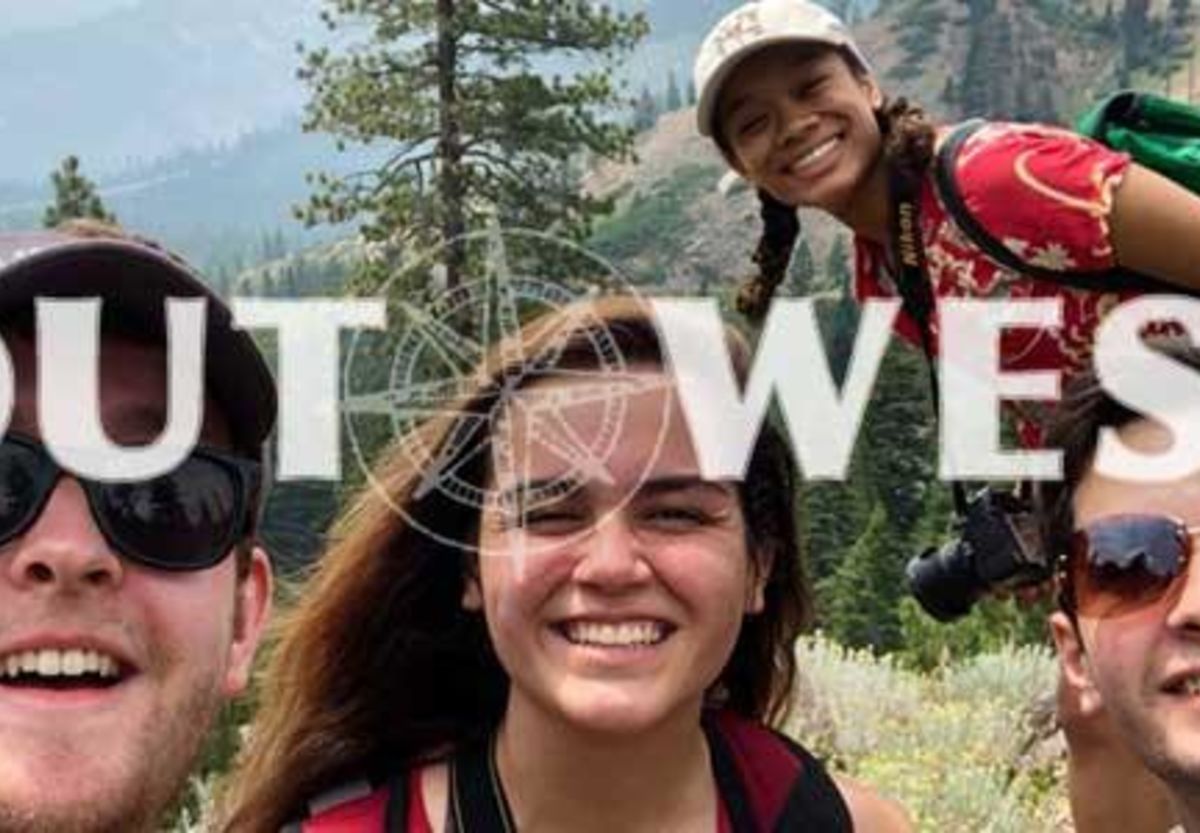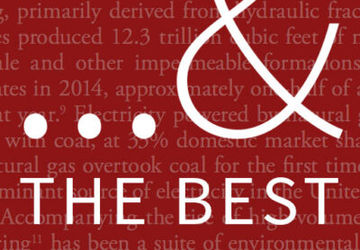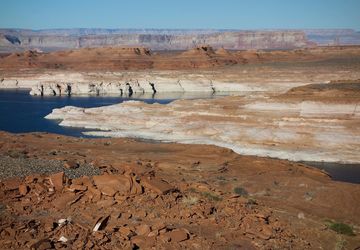
Photos (clockwise from left): Discussing wildfire at the 2018 Eccles Family Rural West Conference in Yakima; Henry’s Fork Foundation intern Zach Clayton at work in eastern Idaho; Advisory Council Chair Nelson Ishiyama and David M. Kennedy on the Stanford to the Sea Hike; Barton H. “Buzz” Thompson at the Aging Water Infrastructure Workshop in February; Iris Hui, right, with 2017-18 Thomas D. Dee II Dissertation Fellow Natalie Pellolio.
From the Yakima River Canyon to Utah’s Goblin Valley, the Center journeyed across the American West in 2018. Our research and field courses focused on connections and collaboration across the region, through examinations of water, land, and fire management, borders and identity, and public opinion.

Undergraduate Programs
Generous Endowment Gifts Ensure a Permanent Home for Undergraduates
Providing Stanford students with opportunities to experience the West has been central to the Center’s mission since its founding. Through classes on campus and in the field, internships, and research, we are fortunate to work with young people who are bound to form the next generation of western leaders. At office hours and on long bus rides across the West, I am encouraged by their creativity, poise, and most of all, their curiosity about our region.
In April, the Center’s Advisory Council launched a campaign to permanently endow these programs. Thanks to the leadership of our Advisory Council Chair Nelson Ishiyama and Faculty Director Emeritus David Kennedy, I am pleased to share that within nine months, the Center has received nearly $3 million in pledges to support western courses and internship opportunities for Stanford undergraduates. The generosity of our supporters will help shape the future of our region as more students, like our 2015 Henry’s Fork Foundation Intern, Christina Morrisett, pursue lifelong careers in the West.
This year, we are especially proud to celebrate the 15th anniversary of the Center's internship program, which has placed over 100 students at nonprofit and public agencies across the West. We welcomed new hosts like the U.S. Army Corps of Engineers, and the documentary producers Galatée Films. Stanford students now have a wide range of opportunities to engage with critical issues of the West, ranging from watershed management to the profitability of working lands.

The “Out West” Student Blog
The Out West blog is a forum for students to share their internship experiences and research results. The Center offers 10-15 immersive and unique internship experiences each summer for Stanford undergraduates. Read about their experiences in the West.

A Journey Through Southwestern Public Lands
Via our interactive ‘map journal,’ tracing students’ path through Nevada, Utah, and Arizona over two weeks in September for the course, “Fighting Over Our Common Heritage: Public Lands in the West.”

Student Work from 2018
From podcasts to research reports, Bill Lane Center student fellows produced a number of works in 2018.
Research, Media, and Publications
There is only one word for our academic research agenda in 2018: interdisciplinary.
We are pleased to collaborate with researchers at five of Stanford’s seven schools, including Stanford Earth, Engineering, Humanities and Sciences, Law, and Medicine.
Media and Publications
In 2018, the Center initiated new research collaborations on air quality and rural health and telemedicine; and conducted events like the Aging Water Infrastructure Workshop. The Center’s “...& the West” blog continues in its third year.
Of note is our new partnership with Stanford Medicine and the Sean Parker Center for Allergy and Asthma Research, which examines how policies might lessen the health impacts of increased wildfire smoke on our region, and how telemedicine can reach dispersed and underserved rural West populations. Regardless of future progress limiting greenhouse gas emissions, the West faces numerous adaptation challenges, including sea level rise, increasingly intense wildfires, and drought. Each of these poses governance challenges beyond the current partisan polarization of U.S. politics. Our research will explore how to create new regional collaborations, improve permitting processes, and invest in more robust infrastructure for a climate that is likely to be more extreme. The Center is committed to bringing impartial evidence and creative design to solving these challenges.
Now in its third year, Felicity Barringer and Geoff McGhee’s “...& the West” blog expanded its reach, both topically and through new distribution channels. Stories included a look at how Baja California sacrifices groundwater to grow strawberries for the U.S.; a detailed interactive map of crops across California; a counterfactual history of Pacific Northwest hydropower; and the editorial intern Emily Wilder on the symbiotic relationship of California almond farms and migratory bee colonies.The Knight-Risser Prize is on a temporary hiatus following two symposia in 2017 celebrating reports on the impacts of Hurricane Harvey in Texas, and groundwater depletion in the West. We are working with our partners at the John S. Knight Journalism Fellowships to retool it as an even better platform to support and sustain western environmental journalism. More details to come in the spring.

EMAIL NEWSLETTER
This past spring, we launched a quarterly email newsletter that features our latest research, events and programs. We welcome your feedback. View recent issues and subscribe

ArtsWest Symposium: Ana Raquel Minian, left, moderates a panel of artists and scholars at the ArtsWest symposium “Art and Culture on the US-Mexico Border” at Stanford in May.
JAN LUNDBERG PHOTO
Program and Course Highlights
Using our signature introductory course, The American West, we have experimented with designing public programs that complement the curriculum. One example is a course co-taught by Professors Bruce Cain and Len Ortolano along with Associate Director Preeti Hehmeyer on Sea Level Rise and the Bay Area. The class has evaluated efforts at protecting Bay Area communities such as Resilient by Design as well as in other states such as Florida and New York, and culminated with a workshop on this topic that convenes representatives from South Bay Cities looking at strategies and solutions going forward. This workshop featured a keynote by our Affiliated Scholar, the Retired Lt. General and former Chief of the Army Corps of Engineers, Tom Bostick.
Now in its third year, our ArtsWest program has a dedicated following on campus and in the community. Led by Affiliated Scholar Marc Levin and with the support of John and Catherine Debs, the 2017-18 season focused on art produced under adversity, featuring three programs that explored western art through Chinese photography, women artists and the US-Mexico border. In case you missed it, we welcome you to view the recordings at artswest.stanford.edu.
Our programming for the current academic year uses contemporary photography as a lens for western arts. Affiliated scholar and Guggenheim Fellow Lukas Felzmann launched this series with an exploration of his recent photography across time and western landscapes spanning New Mexico to the Farallon Islands.
Adding to Our Team
Two of our staff have moved on to new endeavors in the past year. Surabhi Balachander and Thu Nguyen have gone on to graduate and medical school respectively. In their place, we are fortunate to have added Stephanie Burbank and Catherine Wright. Our Advisory Council has added new members including John Debs and Christy Wyckoff, who has served as a mentor in our summer internship program.

Looking to 2019
On behalf of the entire Lane Center team, I wish you the best for the new year. We invite you to visit us anytime your travels take you West.

Bruce E. Cain
Spence and Cleone Eccles Family Director
Charles Louis Ducommun Professor in Humanities and Sciences
Recent Center News
Image Credit: Getty Images



